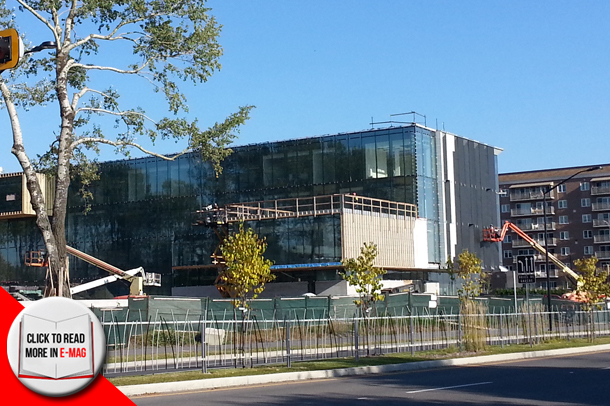By Leah Kellar
I.T.R. Acoustique (I.T.R.)— a construction industry leader specializing in interior systems based in Quebec— is continuing to make smart maneuvers to anticipate and prepare for any curveballs that the market may throw its way. This foresight, according to managing director, Alexandra Roy, who is also the daughter of company president, Yvan Roy, will ensure the next generation of business and business leaders for I.T.R.
“I.T.R. is known to see those curves ahead of time. Normally when the market is slowing down I.T.R. has been able to keep its market share or even have growth, so we’re really looking ahead right now and working toward projects and new avenues to make sure that we will not be decreasing our revenues and the number of projects will keep growing; whether or not the market is diminishing in the Province or in the States,” she says.
Roy attributes I.T.R.’s success in great part with Yvan Roy’s focus on staying ahead of market curves and changes in the industry. His forward thinking led to a decision to split the company he founded in 1983 into two distinct companies in 2008, forming partnerships with several loyal and experienced employees after 25 years of innovation and growth. It also led to branching into the American market in 1996. This was yet another strategic move to ensure the next generation of business for I.T.R.
Today, I.T.R. ranks among the top 500 largest companies in Quebec (at number 286) with an average of 500 people on worksites annually. The company specializes in the core services of metal stud framing, insulation and soundproofing, drywall installation, plastering, suspended ceilings, wall systems (interior and exterior), carpentry, acrylic coating and other membranes, and E.I.F.S.
A list of I.T.R.’s milestone projects include: The Bell Centre in Montreal, the CSUM in McGill University Health Centre (which Roy notes is probably one of the biggest drywall projects ever given to any subcontractor in North America—it’s over $45-million worth of drywall.), Pierre Elliot Trudeau Airport in Montreal (which is still in progress), and the World Golf Hall of Fame in Florida.
Interestingly enough, I.T.R. has distinguished itself by tackling complex commercial, industrial and institutional projects where others may fear the climb or the claustrophobia, quite literally—this is part of what is meant by complex, Roy explains.
“Anywhere where installation can be problematic is really our strength,” she says. These days the company doesn’t touch any residential projects, but that was not always the case.
The company started off in the Quebec City region with concentration in the residential sector, but it was ITR’s bid on the IBM-Marathon Tower— a 1,000,000 square feet triple A 55-storey office tower including 600,00 square feet tenant interior fit-ups for IBM, Chubb Insurance and Price Waterhouse — a commercial project, that really provided I.T.R. with its first major breakthrough.
CEO, Roy, made a convincing appeal to the president of Magil Construction who was the general contractor at the time for the project. The pitch was based on the confidence he had in his team of hard working people, many of whom used to work in the U.S, and were demonstrably successful on some very major projects there.
“Originally they were only working in residential, but it didn’t take long for my father to realize the opportunities that the commercial sector had for his business. So to provide labor work for the people that were working for him at the time year around he decided to go to some major commercial projects…” says Alexandra proudly speaking of her father’s entrepreneurial start.
His confidence in his employees’ competence to work on a major project, his daughter suggests, is what made the general contractor feel comfortable giving I.T.R. the project, and from that day on the company had two offices. I.T.R. open its second branch in Montreal in 1987 to better serve clients there and in Western Quebec regions. In the years following, I.T.R. (mainly based in Quebec now) has secured a number of milestone projects in the course of its evolution in the Canadian and U.S markets.
“Because the owners are French-speaking people, it helped a lot to stay in the province of Quebec, but since he had a lot of workers that did go to the U.S previously in the late 1990s, he saw some really good opportunities in the U.S to expand,” says Roy.
She recalls it was in 1996 that her father opened an office in the region of Orlando Florida. Roy had a team move from Quebec to prepare to work in the new Florida office where they were quite successful with some major projects: the World Golf Hall of Fame, Muvico mall and condos in Naples. The company remained in Florida for about 10 years.
Roy notes that they decided to move the U.S. office to more familiar territory owing to economical situations, labour differences, and climate conditions that many companies are not used to in Canada and other northern countries.
Consequently, I.T.R. decided to move its U.S. office to a more familiar territory in New England pursuing their core activities in the states of: Massachusetts, Vermont, Maine, New Hampshire, New York State. In 2008 they also started operating in Ontario with a couple of projects in Kingston, Ottawa, and Sudbury. The Ontarian market is quit different from Quebec and an adaptation was required for both the operations and administration team.
“The management and how unions work; it’s completely another market and a mindset. When Montreal underwent a massive boom with all the hospitals, about four years ago, we stopped having projects in Ontario because we had to focus our team on the exponential growth. We more than doubled our labor force work and our project revenues in 2011,” Roy told Business Elite Canada.
Roy accounts I.T.R.’s challenges with this mindset, but also with facing high competition,
“Innovation is somewhat limited in our domain and the competition is tough. There’s a lot of competitors in our market so what we’re looking to do in the next years is to differentiate by expanding the services that we provide. I can’t say specifically what we’re going to do but we have a plan to not only look forward geographically, because we are currently also looking at whether we should have another international extension, but also diversify our services to provide better and more complete service for our clients.”
Currently I.T.R. operates an office in Massachusetts with the aim of freeing up another office in elsewhere on the East coast. “Certain markets have been booming in the U.S., like California and Texas, but we’re going to focus on the East coast for now,” says Roy.
Roy affirms that the construction industry has identified as being a growing market for the past 14 years, “We’ve never seen a cycle that long for growth so we’re really anxious to know how and when this cycle will turn around, and how we’re going to get through that economical decrease regarding construction projects.” That means that I.T.R. in the spirit of its founder and CEO, Yvan Roy, will continue to be on the lookout to see when that curve will hit, and how they will effectively manage it to stay ahead of the competition.
I.T.R. received a number of recognitions for the education of its staff, number of hours, projects and revenues. For I.T.R., it’s all about sustaining its place in the market as a leader. “We want to establish ourselves in other markets and keep the same structure in these new markets. We want to be ready with a team for the next generation to evolve into senior managerial roles,” says Roy. “We want a team to go on for at least another 30 years.”







